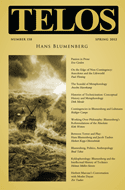Rüdiger Campe’s “Contingencies in Blumenberg and Luhmann” appears in Telos 158 (Spring 2012). Read the full version online at the TELOS Online website, or purchase a print copy of the issue here.
 For both Hans Blumenberg and Niklas Luhmann, “contingency” is a key term in their respective philosophical endeavors. While their concepts differ significantly, they complement each other: Blumenberg’s “contingency” is onto-theological and refers to the Judeo-Christian God, the creator of the world. If God has created the world, he also could have created another world. Creation implies the contingency of the world’s beginning or constitution. Luhmann’s “contingency,” on the contrary, is procedural and pinpoints a feature in communication. According to Talcott Parsons, the selection in the action system of communication is not only dependent on the choices of the one partner in communication—Ego—but also on Ego’s assumptions about the selection of the other partner—Alter. Such contingency means dependence and—in Parsons’s famous theory further developed by Luhmann—double dependence. This essay argues that there is an important complementarity between cosmological contingency—the possibility of the world to be created this way or another—and procedural contingency—the mutual dependency of partners in interaction. Taken together, they allow a procedural understanding of origin or constitution. While the essay is mainly interested in structure, it is also suggested that contingency (in the double sense of Blumenberg and Luhmann) may be seen as essentially linked to the German situation after World War II.
For both Hans Blumenberg and Niklas Luhmann, “contingency” is a key term in their respective philosophical endeavors. While their concepts differ significantly, they complement each other: Blumenberg’s “contingency” is onto-theological and refers to the Judeo-Christian God, the creator of the world. If God has created the world, he also could have created another world. Creation implies the contingency of the world’s beginning or constitution. Luhmann’s “contingency,” on the contrary, is procedural and pinpoints a feature in communication. According to Talcott Parsons, the selection in the action system of communication is not only dependent on the choices of the one partner in communication—Ego—but also on Ego’s assumptions about the selection of the other partner—Alter. Such contingency means dependence and—in Parsons’s famous theory further developed by Luhmann—double dependence. This essay argues that there is an important complementarity between cosmological contingency—the possibility of the world to be created this way or another—and procedural contingency—the mutual dependency of partners in interaction. Taken together, they allow a procedural understanding of origin or constitution. While the essay is mainly interested in structure, it is also suggested that contingency (in the double sense of Blumenberg and Luhmann) may be seen as essentially linked to the German situation after World War II.



